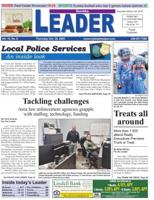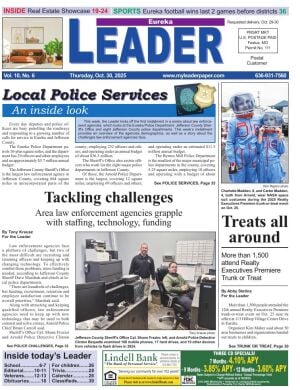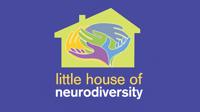The Jefferson County Library has begun a partnership with the Little House of Neurodiversity in an effort to offer more inclusive programming at its various locations, with a new study skills course at the Windsor Branch starting on Saturday, Aug. 2.
This month marks the 35th anniversary of the Americans with Disabilities Act (ADA). It’s also Disability Pride Month, which is dedicated to fostering greater understanding and acceptance of disability and promoting the inclusion of people with disabilities in all aspects of life.
“We aim to make all our programs as accessible to everyone as possible at JCL (Jefferson County Library). But, through the partnership with the Little House of Neurodiversity, we’re able to host programs led by instructors who have worked with a wide range of people, including those who have autism, ADHD or other conditions that might mean they think and learn in unique ways,” said Charlene Oldham, adult services manager at the Jefferson County Library-Arnold Branch.
Oldham said she lives with cerebral palsy, a disability that affects her walking and balance.
“I think it’s one thing to say that libraries are for everyone. It’s another thing to see programs being offered that are intentionally meant to be accessible and inclusive, and to see people with disabilities working at the library,” Oldham said. “It proves that ‘libraries are for everyone’ is more than just a maxim for JCL.”
Little House of Neurodiversity
Little House of Neurodiversity, founded in January 2022, serves Jefferson County, focusing on neurodiverse people, including those with ADHD, autism, dyslexia and beyond, said Heidi Rosenthal, founder and CEO of the nonprofit organization.
“We provide resources to give neurodiverse individuals a platform to interact with the community on their terms,” she said. “We work to educate the community around them so that the individuals will be fully seen and accepted.”
Rosenthal said Little House of Neurodiversity is hyperfocused on serving Jefferson County, where there is a demand for specialized programs.
“We hold our programs at places within the community. The Jefferson County Library is just one more outlet and has been a pleasure to work with,” she said. “They have many libraries in the county, which means different programs at different locations.”
The idea behind the programs and courses offered at the library is to teach people how to use different tools to reach their personal goals, Rosenthal said, adding that sometimes those tools might look different than those used by someone who is neurotypical.
“We want to reach a little higher for everyone. We don’t believe that because someone is neurodiverse they can’t do something. We believe they can do anything that neuronormative people do,” Rosenthal said.
Eric Elizondo, a neurologist at St. Louis University Hospital and a Little House of Neurodiversity board member, said everyone has some form of neurodiversity.
“But, certain brains see, interpret or work through the world differently than others, and those are part of what would be called ‘neurodivergent,’ as opposed to ‘neuronormative.’ That is oftentimes associated with various medical diagnoses or a variety of things that change the way you interact and your brain chooses to interact with the world,” he said. “So, we at Little House of Neurodiversity are trying to create resources for folks who are neurodivergent and remind them that they are deserving of love, deserving of support and deserving of appropriate accommodation.”
Elizondo said programs like the ones being held at the Jefferson County Library are needed.
“The initial primary drive for doing this was to help neurodivergent folks who have learning disabilities utilize the best strategies for success in daily life, as there are some folks who are just extremely highly intelligent, and then they can use a poor strategy, but their brain will make up the difference anyway,” he said. “This is designed for folks to reach their goals, no matter what type of brain they have, by utilizing well-researched strategies. Everybody and their grandmother would benefit from these programs, young or old.”
Programs
The Jefferson County Library began its districtwide partnership with The Little House of Neurodiversity this spring. Little House of Neurodiversity programs that have been offered through the JCL include a sensory-led, single-session drawing class for teens and adults held in May at the Arnold Branch and a breath work summer series with therapeutic professionals held in June at the Northwest Branch in High Ridge.
“While Little House arranges the instructors, these programs are open to everyone, which is great because we’ve been able to host classes on topics that we would not be able to teach ourselves,” Oldham said. “The breathwork class at our Northwest Branch is a great example because Little House was able to enlist a teacher who is a certified breathwork facilitator and licensed massage therapist to lead the program,” said Oldham.
The library’s newest program with Little House of Neurodiversity will be a pilot study skills program at the Windsor Branch, 7479 Metropolitan Blvd., from 10-11:30 a.m. starting on Aug. 2 and running every Saturday morning until Oct. 18. CindyJo Fryer, the educational lead for Little House of Neurodiversity and instructor of the new Study Smart program, currently teaches chemistry at Hazelwood West High School.
The Study Smart program focuses on learning tips and tricks for retaining information. The program is free and open to all adults, with registration encouraged to manage capacity.
“During the course, we will learn together how to take the leading research on learning and memory and apply it to everyday life, from studying for the test to remembering the grocery list to figuring out the best way to learn a new skill,” said Aaliyah Kindt, library services and outreach coordinator for the Jefferson County Library. “We will tackle how to be the most successful learners and remember more in less time, retaining it for longer, taking a research-based, activity-focused, fun group approach to learning how to learn.”
More than books
The library aims to support community needs and make programs available to a diverse audience, Kindt said, adding that it’s important to make library programs and library facilities accessible and welcoming to every resident of Jefferson County.
“I think a lot of people, obviously, think of the library as a place for books. But, we also have movies, puzzles, activities, great support programs and databases that can aid in daily functions. We also have passport services, printing and scanning, these things that can really make a difference in your day-to-day life,” she said.
For more information about programs at the Jefferson County Library, visit jeffcolib.org. For more information about the Little House of Neurodiversity, visit littlehousemo.org.




